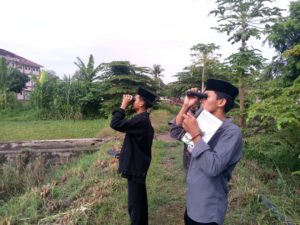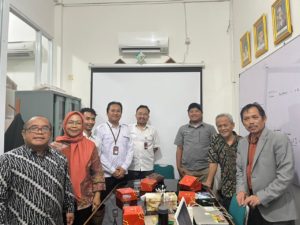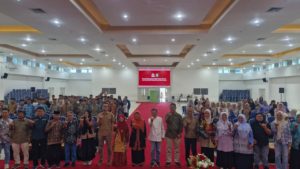In September 2015, the sky above Kalimantan, Indonesia, turned a dark yellow as fires swept across the region’s peatlands emitting a dense haze. The streets became empty of people and the air— thick with smoke—difficult to breathe.
“Whenever I recall that moment, it’s always traumatic for me,” Emmanuela Shinta, a youth Dayak activist who was in Kalimantan that day, told UN Environment. “Our city became like a dead city.”
Indonesia has experienced forest and peat fires since the late 1990s, but in 2015 forests and land burned out of control after human-ignited fires were exacerbated by a drought and one of the strongest El Niño in recent years. The resulting haze not only cost the Indonesian economy US$15 billion but impacted negatively on the health and livelihoods of millions of people. It is estimated to have contributed to more than 100,000 premature deaths.
“About 50 per cent of the rainforest has gone in the past 20 years,” said Shinta who is the founder of the Ranu Welum Foundation. “Ninety per cent of the orangutan’s habitat no longer exists because of deforestation.”
Slash-and-burn farming is a tradition in Indonesia, with fires started deliberately in order to quickly clear land for palm oil and pulpwood plantations. But the fires that roared through the lowland areas of Sumatra, Kalimantan and Papua in 2015 were largely due to the draining of peatlands by extractive industries. Fires on peatlands release three to six times more particulate matter than fires on other types of soil. According to Greenpeace Southeast Asia, the draining of peatlands resulted in the landscape turning into “a huge carbon bomb.”
Indonesia’s government, led by president Joko Widodo, responded to the 2015 fires by issuing a moratorium to halt drainage and development on peatlands, ban slash-and-burn techniques, launch an ambitious programme to restore degraded peatlands and institute a more prevention-focused approach to managing fire. It also established a Peatland Restoration Agency and called on UN Environment and partners to establish the Global Peatlands Initiative— a partnership of more than 28 organizations working together to save peatlands as the world’s largest terrestrial organic carbon stock.
“We never sleep here in Indonesia because we are always watching for fires on our peatlands,” said Raffles Panjaitan, Director, Forest and Land Fire Management, Ministry of Forestry, Indonesia.
Siti Nurbaya, Minister of Environment and Forestry added that the country recognized the need for “credible and legitimate analysis and tools” for the conservation and sustainable management for tropical peatlands.

But it wasn’t just the government and the international community that responded decisively. The Indonesian Islamic council issued a fatwa in 2016 (the top ruling of Islamic law) describing it a sin for people to deliberately burn forests to clear the land for growing crops.
Even though it cannot be enforced, the unprecedented rule sent a strong message to a country that hosts the largest Muslim population in the world, at 225 million. The government at the time said it hoped the moral impact of the fatwa would help reinforce laws against forest burning and prevent air pollution events.
Fachruddin Mangunjaya, chairman of the Center for Islamic Studies at the Universitas Nasional in Jakarta, said that the fatwa was issued after it became clear the wildfires were almost entirely caused by human activities.
“The advice was issued by the Indonesian Ulema Council to the community near the forests and fragile areas such as peat swamps,” Mangunjaya told UN Environment. “We also started working with the related government institutions, such as the Ministry of Environment and Forestry and the Peatland Restoration Agency to disseminate the fatwa through Islamic clerics.”
Iyad Abumoghli, principal coordinator of the Faith for Earth Initiative at UN Environment, says there is a big advantage of faith-based organizations such as the Indonesian Ulema Council supporting in crisis management over natural resources. With around 60 Islamic countries around the world, the fatwa could be a door for other Islamic countries to similarly link religious values to environmental challenges.
“Although destruction of natural resources is forbidden as per the Holy Quran and teachings of Prophet Mohammad, the fatwa by the Indonesian Council of Ulama is unprecedented,” said Abumoghli. “It comes at a time when faith followers need to know the stand of their religion on contemporary issues that have not been addressed as per the terminologies we use today.”
Meanwhile, Shinta’s foundation and a group of Singaporean non-governmental organizations created the Haze Shelter—a safe room to be used for evacuations whenever haze events occur. The shelter is a concrete building with one door, which provides the only entry for air. Inside, two filters clean air that is coming in, with one dedicated to capturing particulate matter.
Indonesia hasn’t experienced fires of the scale of 2015, but there is still a threat. Joint initiatives by the national government, Islamic Council and non-governmental organizations have shown positive results. Earlier this month, the head of Indonesia’s peatland restoration agency, Nazir Foead, said that they had restored around 65 per cent of damaged peatlands on government land.
“Action needs to happen at many levels to avoid peat fires, and restoring the water level in drained peatlands should be a community priority,” said UN Environment peatlands expert Dianna Kopansky. “Rewetting drained peatlands not only prevents fires, but also reduces ongoing greenhouse gas emissions linked to peat degradation. Rewetting also reduces subsidence and enhances biodiversity—a triple win for all.”
Air pollution is the theme for World Environment Day on 5 June 2019. The quality of the air we breathe depends on the lifestyle choices we make every day. Learn more about how air pollution affects you, and what is being done to clean the air. What are you doing to reduce your emissions footprint and #BeatAirPollution?
The 2019 World Environment Day is hosted by China.
LIHAT JUGA:





